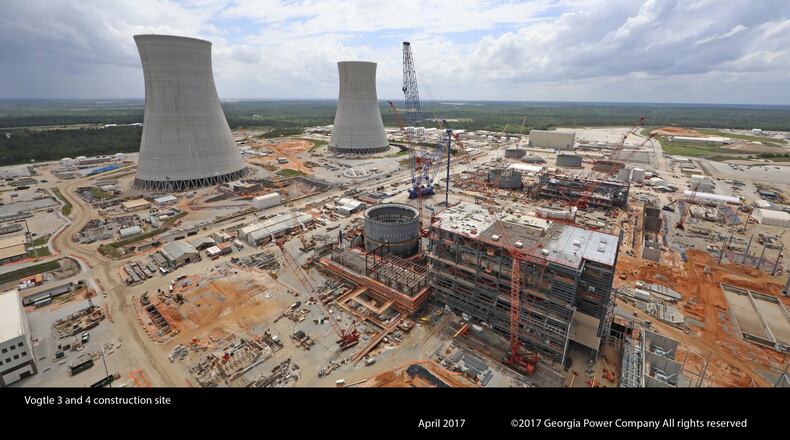After years of delays and cost overuns in the expansion of Plant Vogtle nuclear power site, state regulators are concerned Georgia Power won’t meet its new timetable for completion and additional hiccups could doom the project.
Staff and independent analysts for the Georgia Public Service Commission said last week the situation is so dire that the agency needs to hire another outside consultant to protect consumer interests and ensure the project is not further delayed.
The staff is seeking $3.6 million to hire a consultant, a proposal that underscores growing concern about the future of the $27 billion project. Ratepayers across the state are on the hook every time the project cost increases.
“Vogtle is costing people a lot of money, it’s affecting our quality of life. It hits our pockets. We have made a big and expensive mistake in the state of Georgia,” said Jocelyn O’Neal, a ratepayer who appeared before the commission last week.
Georgia Power, which is leading the plant expansion, maintains that the project is on schedule and will be completed by late 2022, if not earlier. PSC staff monitoring the nuclear expansion’s construction and financial progress said input from another private consultant would help identify problems affecting the construction as they occur.
“We don’t want a billion-dollar surprise all of a sudden. We want to have an independent assessment that we can rely on and that we hope the commission can also rely on that either validates what the company is stating or perharps agrees with us,” one of the staff members told the commission at its meeting last week.
In a staff report released late last month, analysts stressed the need for the commission to increase oversight as the plan to add third and fourth reactors to the nuclear power plant, south of Augusta, nears construction completion and testing will begin.
“The status of the Project is uncertain,” the report said.
The consultant, Cost Plus Technology (CPT), a nuclear construction oversight company based in New Jersey, will provide regular reports and real time project analysis which may help state regulators determine whether costs incurred in the project were prudent or not.
The latest development in the Vogtle construction saga comes after another announcement over the summer by Georgia Power of cost overruns which intensified legal challenges.The turmoil almost halted the project.
As the state body that oversees investor-owned utility companies, the Public Service Commission (PSC) must sign-off on many aspects of the nuclear plant’s expansion that could impact customer bills. The PSC has faced public criticism as the project got delayed by years and its cost ballooned by billions.
Last year, the project went through a management change after Westinghouse Electric Company, which had been the project manager, declared bankruptcy. Southern Nuclear, a subsidiary of Georgia Power company's Southern Company, has been in charge for the past 18 months.
Although productivity levels have improved since the company took over management, the commission staff is skeptical that the set deadlines of November 2021 for unit 3 and November 2022 for unit 4 would be met due to a persistent shortfall of craft labor, schedule delays and other scheduling issues.
They are wary that the project could face another schedule slip.
The PSC staff analysts dismissed as “overly aggressive” an accelerated completion schedule which Georgia Power still maintains it will achieve. The staff also cautioned that an accelerated schedule could lead to bad decisions, waste of resources and the need to do work that was previously not well executed.
The project has reported a shortfall of nearly 350 electricians and another 350 pipefitters and hiring efforts have so far yielded “very little progress,” the staff report said.
Staff said it may take until early next year to determine whether the current schedule would be changed or not, based on an assessment of the available labor force.
With the project approaching a critical phase, commission staff said the scope of what will need to be reviewed will increase substantially.
“In order to continue to effectively monitor the Project and keep the Commission properly informed about the costs and schedule, we now need additional expertise…,” they wrote in their report to the commission.
Sara Barczak with the Southern Alliance for Clean Energy said the requested $3.6 million for an outside monitor, although significant, is like a drop in the bucket compared to the total project budget.
She said additional oversight holds promise to save ratepayers in the long run.
“It’s getting into that realm where we all get frustrated,” said Barczak. “When is the point of no return? When do we know or will be told that these schedules are unachievable and does that mean another project cost increase above the recent $2.3 billion?”
The project, which currently costs $200 million a month, is expected to cost ratepayers nearly $4 billion in financing costs and income tax expenses upon completion. That figure is likely to increase and affect ratepayers who have financed the project since construction began in 2011.
With nearly three years left before unit 3 is expected to go online, experts warned the cost consequences could be severe depending on the duration of the delay. A delay of more than eight months may deem the project, now about 71 percent complete, “uneconomic to continue.”
“I am just hopeful that this time the commission listens to their staff who have been right all along,” said Barczak.
Why it matters.
Plant Vogtle is one of the most expensive power projects in the country. Georgia ratepayers are on the hook when new costs increases are made.
In the latest Vogtle Construction monitoring hearings, PSC analysts expressed skepticism over Georgia Power’s ability to meet set project deadlines. The project is suffering craft labor shortages, unfinished schedules and work slippages. They are recommending the commission hire an independent monitor who will provide additional oversight over the project which is approaching system testing.
“The cost consequences of project delay could be severe depending on the duration of the delay,” warned PSC anlysts in their report.
About the Author
Keep Reading
The Latest
Featured


